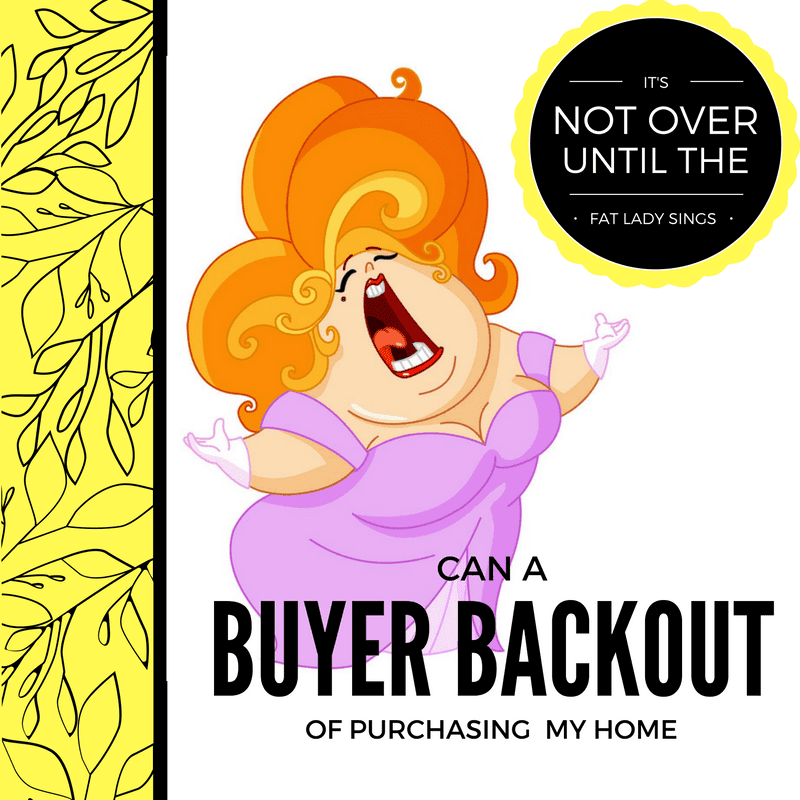
The question often arises, “can a buyer back out of an accepted offer on a house?” after putting their home under contract. Of course, it is great to be under contract but don’t think you are on easy street.
Simply put, it’s not over till the fat lady sings!!
When it comes time to sell your home, there is always risk involved when a seller takes their home off the market for a buyer.
While you have done everything possible to put a good transaction together, things happen that can prevent your buyer from closing.
It is not over until the closing is complete and the deed is recorded. Anything can happen while you are in escrow waiting to close.
Can A Buyer Back Out Of A Real Estate Contract?
The short answer is yes. A buyer can back out of an accepted offer on your home.
The question is how easy is it for a buyer to back out of a real estate contract?
The answer to that is it depends. There are several scenarios that can play out if a buyer decides to walk away from a real estate contract.
A Buyer Backs Out And Exercises A Contingency The Real Estate Contract
The first scenario is the buyer terminates a contract under the right given to them in a contingency in your purchase contract. A contingency is where something must happen for the sale to occur, like a buyer being able to secure mortgage commitment by a certain date.
If the buyer backs out based on terms of a contingency, usually there is language stating that all earnest money deposits are returned. The contingency will further state the contract is null and void and no further recourse can be pursued by either party.
Many of the basic contracts, in Massachusetts, are written relatively the same when it comes to purchasing a home. There are typically two standard contingencies in the contracts where buyers can withdraw from a contract and if done in a timely manner and properly they will receive all deposit monies back.
- Mortgage Contingency- The buyer usually has about 30-45 days from the date of signing the contract to secure a mortgage. If they cannot obtain financing by a certain date they can notify the seller and back out of the contract with no recourse to them. As a seller it is important to keep that date tight usually no more than 45 days out. You don’t want to find out two days before closing that the buyer cannot perform.
- Home Inspection Contingency- The home buyer will typically have 5-10 days to complete a home inspection. If anything is to their dissatisfaction they again may withdraw from the contract with no further recourse to the buyer. (unless new terms can be negotiated after the home inspection)
Once the contingencies have passed then a home buyer must complete the sale or risk losing their earnest monies.
While most transactions that have reached this point will close on time there can be unforeseeable events that could prevent the buyer from closing on the purchase of your home.
Buyer Backs Out A Real Estate Contract For Reasons Other Than A Contingency
So this leads to another scenario where a buyer backs out of a contract for reasons other than what is spelled out in a contingency. There can be a wide range of reasons why a buyer does not close on a property.
Some of the more common reasons are:
- Loss of job/ income- not being able to pay the mortgage or their financing is withdrawn
- Credit profile has changed in which event the financing can be withdrawn
- Buyers just change their mind, due to illness, lost interest, change of situation, divorce……
In this scenario, the buyers have left a good faith deposit table, typically in the amount of 1% to 5% of the purchase price.
In this scenario, a seller would have a claim on the good faith deposit that the buyer put on the table for damages.
Seller Issues Causing A Buyer To Back Out Of Buying Your Home
Issues that can arise on the seller’s side of the transaction may cause a buyer to walk away from purchasing a home.
Title issues, material change in the condition of the house (fire damage, water damage) not delivering the house as spelled out in the contract and so on….
If something should happen on the seller side that causes the buyer to walk away from a home purchase of course a home seller should immediately return the deposit money and agree to terminate the contract.
Can A Seller Sue A Buyer For Backing Out Of An Accepted Contract?
In Massachusetts, most contracts state that damages are limited to the deposits tendered and all deposit monies are held in an escrow account. The following language is from a Massachusetts Contract to Purchase:
“If the buyers default in the buyer’s obligations and all monies tendered as a deposit shall be paid to the seller as liquidated damages and this shall be the seller’s sole remedy”
So can a seller sue a buyer for backing out?
Of course, you can try to sue for damages or specific performance. But, you signed an agreement stating specifically what would happen if the buyer defualted on the contract. Which is you accepted that liquidated damages are limited to the deposits held in escrow.
There would have to be some extenuating circumstances like fraud for a seller to make any headway in suing a buyer for terminating a real estate contract.
Other Questions
Can A Buyer Back Out After The Final Walk Through?
This is a common question from home sellers. Of course they can back out after the final walk though. But, don’t let you be the reason they back out. Deliver the house as your purchase contract spells out.
Can A Buyer Back Out At Closing?
Again the answer is of course. A buyer can back out of a real estate transaction before or at closing. Technically they can back out all the way up to money being disbursed. In Massachusetts a sale is not complete and monies and keys are not distributed until the deed is recorded.
Preventing A Buyer From Terminating A Real Estate Contract
Get A Large Deposit
One thing you can do is insist on a large deposit. Typically a 5% deposit is the highest amount that is given. Many buyers in this buyers market have gotten away with putting down much less.
Basically, if the buyer backs out of a real estate contract and leaves deposit money on the table you want it to hurt a little, or even a lot!
It could be easy for a buyer to walk away from $1500 dollars but not so easy to walk away from $15,000. Ask for the highest deposit you think the buyer will be willing to risk. A larger deposit that leaves a hole in a buyer’s pocket will help hold them in the purchase of your home.
- Pay Attention To The Buyer’s Pre-Approval
Pay attention to the buyer’s financing. Obviously a deal that has a 20% down payment is more likely to close than a deal that where the home buyer is only putting down 3.5% (FHA Financing).
As a seller’s agent I always verify that assets, income and credit have been verified by the loan officers. There are companies that will issue a pre-qual based on verbal information that is given, this is where deals can start to go bad.
Consider A Pre-Home Inspection
Hire a home inspector to provide you with a home inspection prior to listing your home. Consider fixing items on the report or at least show the report to a prospective buyer so there are no surprises when they do their home inspection. This way they have made an offer based on known issues with the home.
Also truthful about any issues with your home upfront so there are no surprises at the home inspection for the buyer. Carefully fill out your sellers disclosure to the best of your abilities. Most likely your buyer will have a home inspection and if you are trying to hide or avoid an issue it will arise during the home inspection.
Read Your Contract
Read your contract and understand your obligations as a home seller. Deliver the home as the contract spells out. Don’t give your buyer a reason to back out because you didn’t fullfill your obligations or were not ready to close on time.
For example, most contracts state that a home is to be delivered in broom clean condition, free of all debris and personal items. Your contract will spell out a time and date to close. Be ready!! For a buyer having cold feet, if you are not ready to close on time, it is an excuse for that buyer to back out of purchasing your home with no recourse to them.
Don’t Be Afraid To Ask Questions
If something doesn’t make sense to you about an offer, don’t be afraid to ask questions to get clarification.

What Can I Do If A Buyer Is Trying To Back Out Of The Purchase Of My Home?
Consult a real estate attorney at the first sign of trouble. Contract law is complicated and should not be handled by anyone but a real estate attorney. If you are not already working with an attorney on selling your home, find one. Bring them your Contract to Purchase, Purchase and Sale and any communication involving the real estate transaction for him to determine what your rights are in this situation.
What you will probably find is that a small deposit of a few thousand dollars is not worth the time effort or money involved in trying to keep it. But if you are talking significant deposit monies of tens of thousand of dollars, you may find the fight worth it.
Home Buyers: What to Know About Backing Out Of A House Offer
Can I Back Out Of A Buying A House Before Closing
A home buyer can certainly back out of buying a house before closing. And you can back out all the way up to finishing the signing of all the paperwork before the deed is recorded.
But the question is what are the ramifications of canceling a real estate contract? While you have the right to back away from an agreement, it doesn’t mean it is easy or there are not significant, financial downsides for you.
As a home buyer, if you want or need to back out of buying a house, consult with an attorney. Your deposit money can be at risk. And that may be a significant amount of cash.
A real estate attorney will counsel you on how to go about removing yourself from a contract and any ramifications of doing so.
Conclusion
Remember as a home seller you always take some risk taking your home of the market for a buyer. Try and tighten up dates and ask for the largest deposit you can get away with and try to hold the buyer to the deal.
Other Real Estate Resources:
- Kyle Hiscock Top 5 Reasons A Mortgage Is Denied After A Pre-approval
- Xavier De Buck Top Issues Sellers Try To Hide
- Conor MacEvilly Benefits of a Pre-listing Inspection
- Lynn Pineda A Homes Sellers Horror Story
- Elizabeth Weintraub Why Buyers Walk Away
This post, Can a Buyer Back Out of Purchasing my Massachusetts Home? was provided by Kevin Vitali of EXIT Group One Real Estate in Tewksbury Massachusetts. Kevin can be reached at anytime by 978-360-0422 or by email at kevin@kevinvitali.com
If you are thinking of buying or selling Real Estate in Massachusetts, contact Kevin for your free consultation. Make your next real estate transaction a smooth transaction.
Serving the Real Estate needs of Northeast Massachusetts, Merrimack Valley, North Shore and Metrowest including the following communities and the surrounding areas, Amesbury, Andover, Billerica, Burlington, Chelmsford, Dracut, Groveland, Haverhill, Lowell, Merrimac, Methuen, North Andover, North Reading, Reading, Tewksbury, Tyngsborough, Wakefield, Wilmington, Westford




